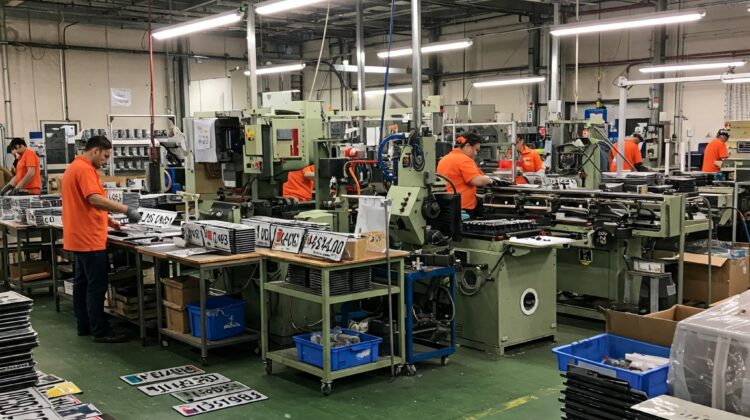
In a significant move to combat vehicle crime and ensure regulatory compliance, Amazon UK has announced a ban on the sale of physical car number plates on its platform. This decision comes in the wake of a BBC London investigation that revealed several companies were illegally supplying number plates without conducting the legally required checks on customer identification and proof of entitlement. The investigation highlighted a concerning loophole that was being exploited by individuals seeking to obtain number plates for illicit purposes, including vehicle cloning.
The sale and production of number plates in the United Kingdom are governed by strict regulations outlined by the Driver and Vehicle Licensing Agency (DVLA). These regulations are in place to ensure the traceability of vehicles, deter criminal activities, and maintain road safety. A key aspect of these regulations is the mandatory verification process that registered number plate suppliers must adhere to before providing a number plate to a customer. This process typically involves physically inspecting original documents such as the vehicle’s V5C registration certificate (logbook) and the buyer’s driving license or other acceptable forms of identification.
The BBC London investigation uncovered that at least seven companies operating on the Amazon UK marketplace were flouting these regulations. They were found to be selling number plates to customers without requesting or verifying the necessary documentation. In some instances, while firms claimed that ID was required, they proceeded to dispatch the plates even when these documents were not provided. Other sellers seemingly disregarded the compliance rules entirely, making it alarmingly easy for individuals to acquire number plates without demonstrating their legal right to them.
This illegal supply of number plates has serious implications, most notably concerning vehicle cloning. Vehicle cloning is a criminal activity where a vehicle’s identity is stolen and replicated onto another, often similar, vehicle. This is typically achieved by fitting the cloned vehicle with number plates that belong to a legitimate vehicle of the same make, model, and color. Criminals use cloned vehicles to commit a range of offenses, including avoiding speeding tickets and parking fines, theft, and even more serious crimes, knowing that any penalties or investigations will likely be directed towards the innocent owner of the genuine vehicle.
The BBC’s findings are particularly concerning given the reported rise in car cloning cases in London. Over a recent three-year period, there has been a significant increase in such incidents, leading to a substantial number of penalty charge notices being wrongly issued and subsequently canceled due to fraudulent registrations. The ease with which illegal number plates could be obtained through online marketplaces like Amazon has undoubtedly contributed to this problem.
Following the exposé, Amazon UK took swift action. The online retail giant confirmed that all seven product listings from the companies investigated by the BBC had been immediately removed. Furthermore, Amazon announced a comprehensive ban on the sale of all car number plates on its platform, with the exception of novelty plates that are clearly not intended for use on public roads. Amazon acknowledged that the complete removal of all non-compliant listings from third-party vendors would take some time to implement fully, but the commitment to cease these sales was unequivocal.
This ban by Amazon has been welcomed by road safety advocates and authorities. Ruth Cadbury MP, chair of the Transport Select Committee, described the findings of the BBC investigation as “hugely troubling” and emphasized the urgent need for stronger enforcement of the existing regulations. Rob Laugharne, managing director of a legitimate number plate supplier, warned that outdated regulations have allowed the online sale of number plates to become a significant loophole that criminals are actively exploiting.
The DVLA and the Home Office have also acknowledged the issue and have pledged to intensify their efforts to crack down on number plate cloning and the illegal supply of number plates. A new Road Safety Strategy is reportedly in development, which aims to address fraudulent vehicle registrations and related criminal activities more effectively.
The regulations surrounding the sale and display of number plates in the UK are detailed and precise. All number plates must adhere to the British Standard (currently BS AU 145e), which specifies the materials, durability, and testing requirements for plates manufactured after September 1, 2021. Prior to this, plates followed the BS AU 145d standard.
Key legal requirements for number plates include:
- Display: Vehicles must display number plates at both the front and rear, except for motorcycles which only require a rear plate.
- Visibility: Number plates must be clean, clearly visible, and not obscured in any way. This includes ensuring that fixings such as screws do not distort the characters.
- Font: The legally mandated typeface is the Charles Wright 2001 font. No other fonts or alterations to the font are permitted.
- Spacing: Strict rules govern the spacing between letters and numbers, as well as the margins on the plate. Altering the spacing to create words or names is illegal. For standard-sized plates, the character height is 79mm, the character width is 50mm, the stroke thickness is 14mm, and the space between characters is 11mm.
- Color: Front number plates must have black characters on a white reflective background, and rear plates must have black characters on a yellow reflective background. Two-tone lettering or background patterns are prohibited. For zero-emission vehicles, a green reflective strip on the left-hand side of the plate is permitted. Historic vehicles registered before January 1, 1980, may display black characters on a white or silver background.
- Supplier Marking: All legally produced number plates must display the name, trademark, or other identifying mark of the manufacturer, along with the name and postcode of the supplying outlet. This marking must be positioned at the bottom of the plate, below the registration number, in a non-reflective color and a specific size (minimum 3mm high).
- British Standard Mark: The number plate must also include the British Standard number (BS AU 145e) to certify its compliance.
- Optional Markings: Certain national flags (Union Jack, Cross of St. George, Cross of St. Andrew, Red Dragon of Wales) and the “GB” identifier are permitted on the left-hand side of the plate, provided they meet specific size and placement requirements. Borders are also allowed if they are a single shade of non-reflective color, 5mm wide, and positioned 10mm from the registration characters.
Suppliers of number plates must be registered with the DVLA as Registered Number Plate Suppliers (RNPS). To become registered, businesses need to apply to the DVLA and undergo checks to ensure they understand and will comply with the regulations. Registered suppliers are issued with a Supplier Identification (SID) number, which they may be required to display. They are legally obligated to keep records of all number plates they supply, including the identification details of the purchaser and evidence of their entitlement to the registration mark. Failure to comply with these requirements can result in significant fines and even suspension from the RNPS register.
For consumers purchasing number plates, it is crucial to use only DVLA-registered suppliers and to be prepared to provide the necessary documentation to prove their identity and entitlement to the registration mark. Buying number plates from unregistered sources or providing false information to obtain them is illegal and can lead to penalties.
Driving with illegal number plates carries significant consequences. Motorists found to be using non-compliant plates can face on-the-spot fines of up to £1,000, and their vehicle may fail its annual MOT (Ministry of Transport) test. In more serious cases, particularly where fraudulent plates are being used, the police have the authority to seize the vehicle. Furthermore, driving with illegal plates can lead to penalty points being added to the driver’s license, potentially increasing insurance premiums. If a vehicle is identified as having cloned number plates, a marker is added to the Police National Computer and Automatic Number Plate Recognition (ANPR) databases.
Members of the public who suspect a vehicle is using illegal number plates are advised to report the matter to the police using the non-emergency number, 101. If someone believes their vehicle’s number plates have been cloned and they have received fines or penalties they are not responsible for, they should also report this to the police and notify the DVLA immediately. Providing as much detail as possible, such as the time, location, and description of the suspected cloned vehicle, can assist the authorities in their investigations.
Amazon’s decision to ban the sale of physical number plates, while potentially inconvenient for legitimate buyers who may have used the platform, is a necessary step towards clamping down on the illegal supply that has been fueling vehicle crime. It underscores the responsibility of online marketplaces to ensure that the products sold on their platforms comply with all relevant laws and regulations. This move, coupled with ongoing efforts by the DVLA and law enforcement, will hopefully contribute to a reduction in vehicle cloning and enhance road safety across the UK. Consumers needing to purchase number plates should now ensure they do so through reputable, DVLA-registered suppliers who adhere to the proper verification procedures.

Jon Cherry is a Director of leading personalised number plate dealer Regplates.com. Jon has over 25 years industry experience handling some of the most expensive plates ever sold with many high profile and celebrity clients. Active since 1991 in the number plate industry, Jon is currently Chairman of the Cherished Numbers Guild, a trade body representing number plate dealers in the UK. Jon has written many articles on the industry and insight into the future of numberplates and the market as a whole.




